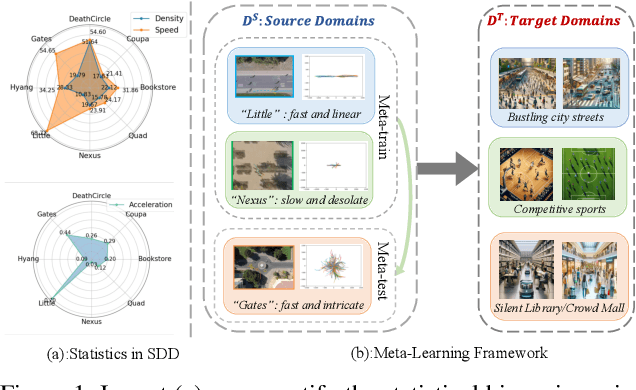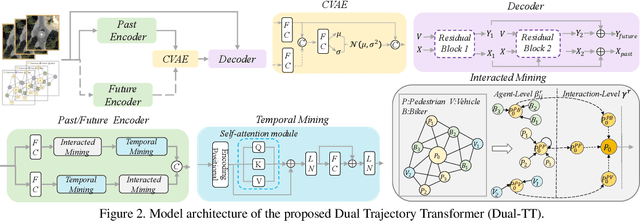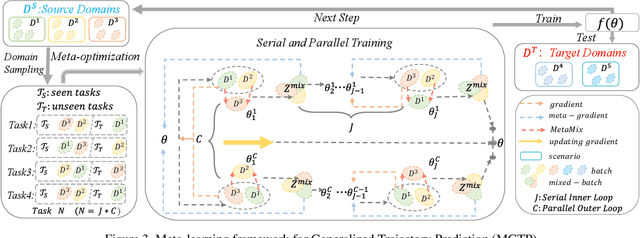Fangli Mou
FusionTrack: End-to-End Multi-Object Tracking in Arbitrary Multi-View Environment
May 24, 2025Abstract:Multi-view multi-object tracking (MVMOT) has found widespread applications in intelligent transportation, surveillance systems, and urban management. However, existing studies rarely address genuinely free-viewpoint MVMOT systems, which could significantly enhance the flexibility and scalability of cooperative tracking systems. To bridge this gap, we first construct the Multi-Drone Multi-Object Tracking (MDMOT) dataset, captured by mobile drone swarms across diverse real-world scenarios, initially establishing the first benchmark for multi-object tracking in arbitrary multi-view environment. Building upon this foundation, we propose \textbf{FusionTrack}, an end-to-end framework that reasonably integrates tracking and re-identification to leverage multi-view information for robust trajectory association. Extensive experiments on our MDMOT and other benchmark datasets demonstrate that FusionTrack achieves state-of-the-art performance in both single-view and multi-view tracking.
C$^{2}$INet: Realizing Incremental Trajectory Prediction with Prior-Aware Continual Causal Intervention
Nov 19, 2024Abstract:Trajectory prediction for multi-agents in complex scenarios is crucial for applications like autonomous driving. However, existing methods often overlook environmental biases, which leads to poor generalization. Additionally, hardware constraints limit the use of large-scale data across environments, and continual learning settings exacerbate the challenge of catastrophic forgetting. To address these issues, we propose the Continual Causal Intervention (C$^{2}$INet) method for generalizable multi-agent trajectory prediction within a continual learning framework. Using variational inference, we align environment-related prior with posterior estimator of confounding factors in the latent space, thereby intervening in causal correlations that affect trajectory representation. Furthermore, we store optimal variational priors across various scenarios using a memory queue, ensuring continuous debiasing during incremental task training. The proposed C$^{2}$INet enhances adaptability to diverse tasks while preserving previous task information to prevent catastrophic forgetting. It also incorporates pruning strategies to mitigate overfitting. Comparative evaluations on three real and synthetic complex datasets against state-of-the-art methods demonstrate that our proposed method consistently achieves reliable prediction performance, effectively mitigating confounding factors unique to different scenarios. This highlights the practical value of our method for real-world applications.
MetaTra: Meta-Learning for Generalized Trajectory Prediction in Unseen Domain
Feb 13, 2024



Abstract:Trajectory prediction has garnered widespread attention in different fields, such as autonomous driving and robotic navigation. However, due to the significant variations in trajectory patterns across different scenarios, models trained in known environments often falter in unseen ones. To learn a generalized model that can directly handle unseen domains without requiring any model updating, we propose a novel meta-learning-based trajectory prediction method called MetaTra. This approach incorporates a Dual Trajectory Transformer (Dual-TT), which enables a thorough exploration of the individual intention and the interactions within group motion patterns in diverse scenarios. Building on this, we propose a meta-learning framework to simulate the generalization process between source and target domains. Furthermore, to enhance the stability of our prediction outcomes, we propose a Serial and Parallel Training (SPT) strategy along with a feature augmentation method named MetaMix. Experimental results on several real-world datasets confirm that MetaTra not only surpasses other state-of-the-art methods but also exhibits plug-and-play capabilities, particularly in the realm of domain generalization.
 Add to Chrome
Add to Chrome Add to Firefox
Add to Firefox Add to Edge
Add to Edge